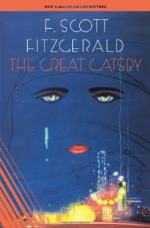|
This section contains 2,140 words (approx. 8 pages at 300 words per page) |

|
The Function of Gatsby in Fitzgerald's 'the Great Gatsby'
Summary: Explores the F. Scott Fitzgerald novel, The Great Gatsby. Highlights the function and role of the character of Gatsby. Evaluates to what extent it is Fitzgerald's intention to elevate Gatsby above the society of which he is a part.
It is possible to watch Gatsby go through a number of transitions as we observe his life story through Nick Carraway's narration, as Malcolm Bradbury points out, he can be seen variously as a `corrupt' person or as a self-defined figure distinct from the background of his tainted social environment or, finally, as a victim of the waste which was endemic in the `lost generation' (Gertrude Stein) of the Jazz Age. Fitzgerald's mastery lies in the construction of the novel, which combines comedy, drama, colloquial language and cinematic techniques to portray a series of scenes which reveal the many facets of The Great Gatsby.
Ultimately he is the victim of his own fervent belief that money can buy him love. The inscription quotation from Fitzgerald's earlier character Thomas D'Invillers gives the reader the clue that Gatsby will throw his hat into the contest to win Daisy's love at...
|
This section contains 2,140 words (approx. 8 pages at 300 words per page) |

|


